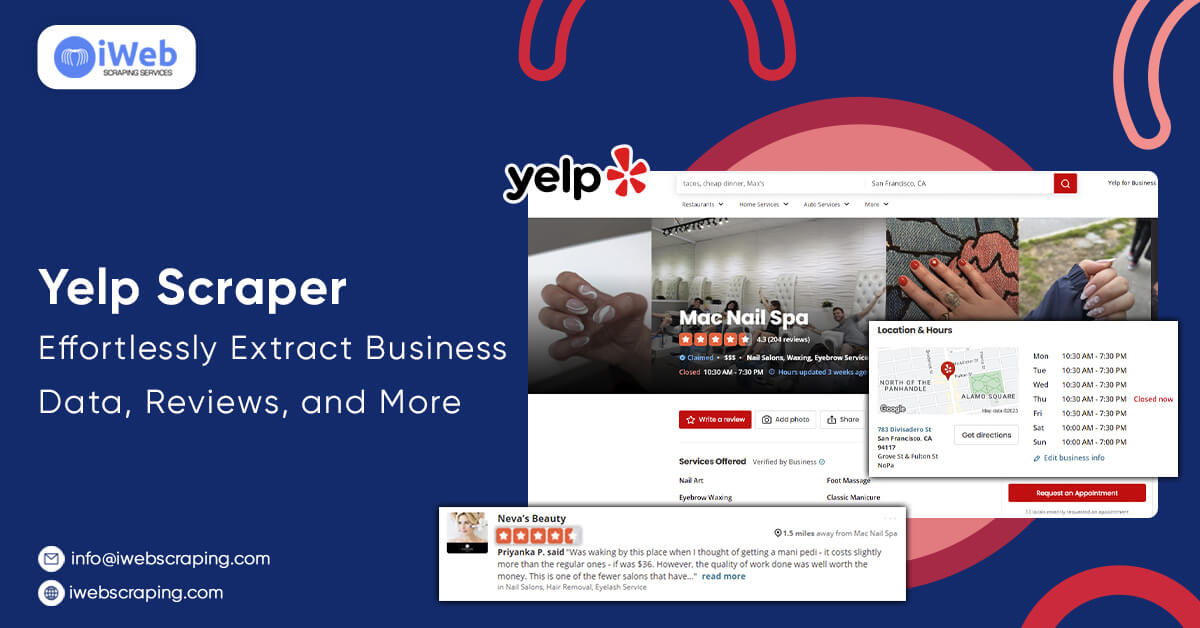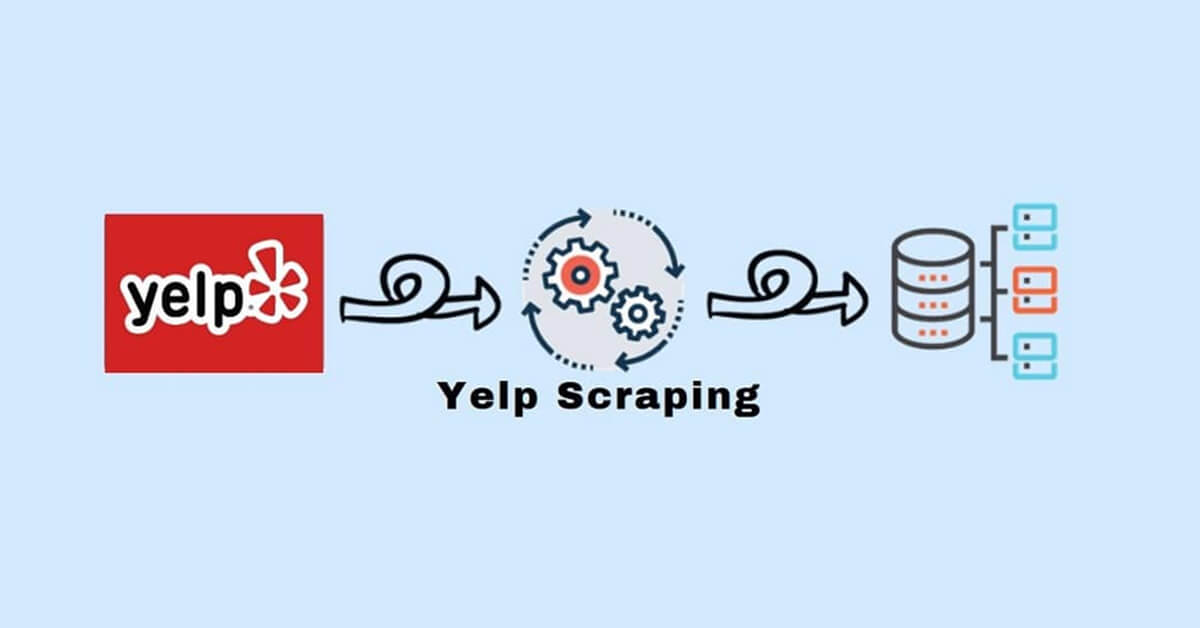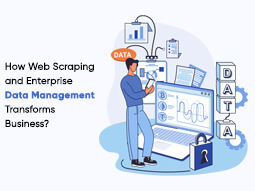Yelp Scraper - Effortlessly Extract Business Data, Reviews, and More

Yelp is used by a lot of people to find and talk about local businesses. Companies that want to learn more about their customers, their rivals, or the market as a whole can benefit from scraping data from Yelp. This post will discuss Yelp Scraper, a tool that can get information from Yelp pages, such as business information, user reviews, and more. In this piece, we'll show you how to use a Yelp scraper to gather and analyze data for various goals, such as finding businesses that do well, tracking how your competitors are rated, and improving customer service. Successful businesses use Yelp Scraper to find important information that helps them make decisions and grow.
You can "scrape" the Yelp website to get information about companies, ratings, and other valuable things. Learning how the HTML structure of Yelp pages works and gathering the necessary information makes the process of gathering information easier. Users can Scrape Yelp Data to get business names, contact information, hours of operation, classifications, and reviews, among other things.
This knowledge can be used for several things, like market studies, evaluating competitors, figuring out how people feel, and making analytics for businesses. By collecting and studying a lot of Yelp data, businesses can learn important things about customer tastes, market trends, and the general standing of businesses.
What is Yelp Web Scraping?

"Yelp Web Scraping" is the process of getting information from the Yelp site with the help of software or programs. It means seeing the HTML structure of Yelp pages, pulling out the information you need, and saving it for later study.
Yelp is a well-known website that lets you look for businesses, read reviews, and find other helpful information about places near you. By scraping a website, users can automate getting this information instead of physically scrolling through each page and getting the necessary information.
There are many ways to use the information that has been gathered. Businesses can use it to do polls, research their rivals, and find out what customers think about the goods and services they sell. Analysts can use the data to look for trends, study how customers act, and develop new ideas.
Programmers can add Yelp information to their programs or make their screens to show how the data is laid out.
But when people scrape Yelp data, they need to follow the terms and conditions of the domain and ensure scraping is done ethically.
The ways of scraping data in Yelp:
Regarding how to take data from Yelp, there is more than one way to do it. There are several. Some of the most common options are:
Manually scraping information:
To do this, you must read Yelp pages, find the necessary information, and put it into an Excel sheet or text file. Even though this method takes a lot of work and time, it could be useful for easy scraping tasks or when there is little information to get.
Website scraping applications:
Web scraping apps like BeautifulSoup, Scrapy, and Selenium make it easier for developers to get information from websites. With these kinds of tools, you can use programming languages like Python to make programs that look at the HTML layout of Yelp pages and pull out the data you need. They have tools for navigating a page, finding specific parts, and saving information in an organized way.
Yelp API:
Using an API, programmers can connect to Yelp instantly and get information from it.
By signing up for an access code and reading the directions that come with it, anyone can send calls to the Yelp API to find out about businesses, how customers feel about them, and how they rank. The Yelp API is helpful because it gives you organized and up-to-date information.
Third-Party Extracting Programs and Platforms:
Several third-party scrapping services and platforms can be used to get information from Yelp. Most of the time, these providers offer easy-to-use graphical platforms and take care of their clients' technical scraping details. Still, they may have limits or charges for their services, so studying and understanding the rules governing how those services can be used is essential.
No matter which cleaning method you choose, keeping the law and good manners in mind is important. Ensure your scraping doesn't break any rules or slow down the site.
Scraping food delivery apps data
Meal delivery apps like Uber Eats, Grubhub, DoorDash, and Postmates can give you information about restaurants, their menus, ratings, comments, prices, and other important facts. Keep the following in mind when getting data from apps that bring food.
Read and understand the terms of service for the app you want to scrape that helps distribute food. Some sites forbid data scraping outright or ask for permission first. Make sure your hacking methods are in line with the app's rules.
Check if the meal service app has an API that gives you access to its information. APIs provide a structured and authorized way to get information, ensuring the site's rules are followed. After getting an API key and reading the API directions, you can make queries to get the information you need.
Use website scraping tools to automate the process of getting the info. These tools can help you read the HTML style of the pages of food delivery apps, pull out the important information, and save it in an organized way. Be aware of how the app's website is set up and ensure that scraping is clear of what they offer.
Do righteous scraping by ensuring your activities don't break any laws or morals. Follow any speed limits or other rules, don't send the app's hosts many requests, and use the scraped data correctly.
Know that there may be restrictions on using the information you've scraped. Read the app's terms of service to find out any restrictions on using data, especially if you want to use the data for business.
Challenges of Yelp Web scraping:
People who scrape Yelp data often have to deal with a few problems. When you try to scrape this information, you may run into some of the following problems:
Yelp has several ways to keep people from stealing information and getting in without permission. Companies may use CAPTCHAs, IP blocking, or other security measures to find and stop scraping activities. You need sophisticated processes and careful management to get around these precautions and avoid being found out and facing big legal penalties.
Webpage Layout Upgrades:
Yelp often changes the HTML labels, sections, and where things are placed on its website. When you scrape Yelp, these changes could break your scrape scripts or give you incomplete or wrong information. To keep up with changes to the structure, it's essential to keep an eye on things and change the scraping software as needed.
Rate Limiting:
Yelp limits access to information to stop people from scraping it for no reason. This means there may be a cap on how many queries you can send in a certain amount of time. Following these rules is essential if you don't want to be blocked or called a bad user.
Yelp has many business names, reviews, and other information. It might be hard to scrape and organize such massive data if you need more storage room, computing power, or a way to connect to the network. Using efficient ways to store, process, and manage data is important.
When harvesting Yelp material, you have to follow the terms of service and any laws or rules that may be in place. Users' privacy and Yelp's rights to its intellectual property must be honored. If you scrape without permission or the wrong way, you could get in trouble with the law.
Conclusion
Even though scraping Yelp data for business reasons can be helpful, it is also essential to do the steps right. If you need the technical know-how to do scraping right, hire a professional or contract service to get the information. Getting wrong information can do more harm than good, so it's important to do it right.




